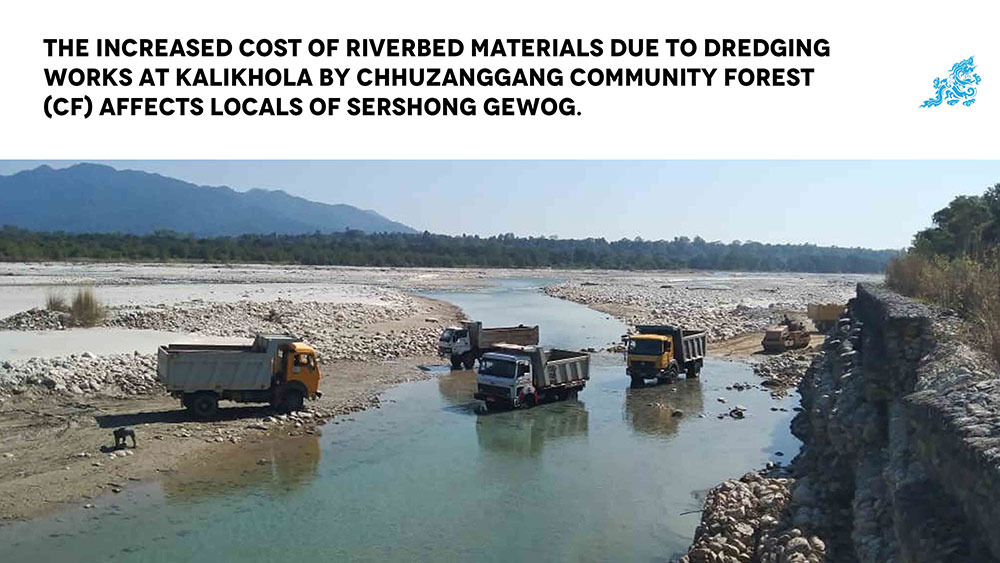Nima | Gelephu
Dredging works at Kalikhola by Chhuzanggang Community Forest (CF) is expected to strengthen mitigation works in the gewog but the increased cost of riverbed materials has affected the people who depend on Kalikhola for sand and boulders.
Kalikhola is the most sought-after place by the people of Sershong and Chhuzanggang for the raw materials. People from both gewogs collected sand and boulders at Nu 2,000 per truck until last year.
This has changed after Chhuzanggang CF identified the spot for dredging in 2020. The boulders collected during the mitigation works were stocked and sold to the people at Nu 1,550 at the source.
The locals and Sershong gewog officials said that raw materials from Kalikhola were bought paying only Nu 50 as royalty fees at the source until the CF started dredging works and came up with new rates for sand and boulders.
Today the rural households from Sershong and Chhuzanggang have to pay Nu 3,500 at least, including the transportation charges.
Sangay Jatsho from Barshong, said that the sand and boulders cost Nu 4,000 per truck today. “We need sand and boulders to build a small shed at home and for repair works. The new arrangement at Kalikhola has affected us badly. We have informed the gewog to intervene,” he said.
He added that other places close to the gewog were identified by other agency and the collection of raw materials restricted in some critical areas. “We were told that a separate area would be identified for us but nothing is told to us so far,” said Sangay Jatsho.
Sershong gup, Tshering, said that it would be difficult to afford the raw materials for the rural population in the gewog because the people have to pay to the community forest and bear transportation charges.
“If CF can’t sell the sand and boulder at cheaper rates, identifying a separate place for us to collect the raw materials would help people of Sershong. A place where people can buy the material at affordable rates,” said the gup.
He added that the initiative from the CF would benefit its member but it affected more than 1,000 people. “We need to look into these impacts. Those materials were never planted and grown by the CF. The resource should be easily accessible to all.”
The local government official from Sershong said that the authorising agency should properly assess the impact. “The issue was discussed in dzongkhag tshogdu for two consecutive years but the resolutions were not received well by the dzongkhag forestry office,” said the gup.
The Chairman of the group, Nima, said that four chiwogs in Chhuzanggang were affected by flood and the community forest also lost acres of bamboo planted in Chaskhar block in the past.
“Without proper management and conservation efforts, we are vulnerable to flash floods and other related disasters. We stepped up the management efforts. The initiative is also in line with the nation’s goal of maintaining at least 60 percent forest cover,” he said.
He added that land close to the Maochhu basin was stabilised and secured after years of management and conservation. “We stopped improper collection of riverbed materials and grazing in the community forest. The gewog and concerned authority supported us. The land and property close to Maochhu are more secure now,” said Nima.
While the main objective of the community forest was to protect the critical areas in the gewog, it also plans to help the community through revenue generation by selling the forest products.
The main product of the group was bamboo for construction sites so far. The group also started selling sand and boulders collected and stocked through dredging works at Kalikhola.
The chairman said that the group sold bamboos worth more than Nu 200,000 annually from four different blocks and sold more than 1,500 trucks of boulders in the past seven months.
“We are planning to improve rural economy through this. We could employ three dropout students after we started dredging works. We took up this as a part of community service,” said the official.
He added that there were risks of rural communities not getting basic construction materials with the concerned agency focusing on export.
The raw materials are sold at cheaper rates for the rural communities and there are different rates for contractors. Proper verification of a document is done to avoid the deflection of the raw materials, according to the chairman.
However, the group could not continue to employ the youth after their plan to export the boulder failed. The CF also stopped dredging works for the past three months.
The group charges Nu 1,550 per truck for boulders meant for rural use and Nu 2,270 for commercial use.
Edited by Jigme Wangchuk


